人教版八年级下册 Unit 6 An old man tried to move the mountains.Section A 3a-3c 课件 (共24张PPT)
文档属性
| 名称 | 人教版八年级下册 Unit 6 An old man tried to move the mountains.Section A 3a-3c 课件 (共24张PPT) | 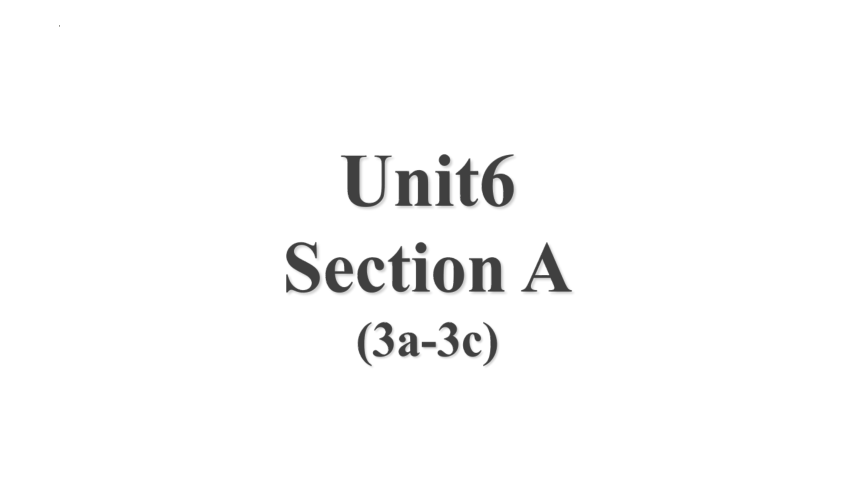 | |
| 格式 | zip | ||
| 文件大小 | 7.3MB | ||
| 资源类型 | 教案 | ||
| 版本资源 | 人教新目标(Go for it)版 | ||
| 科目 | 英语 | ||
| 更新时间 | 2022-08-24 19:19:21 | ||
图片预览

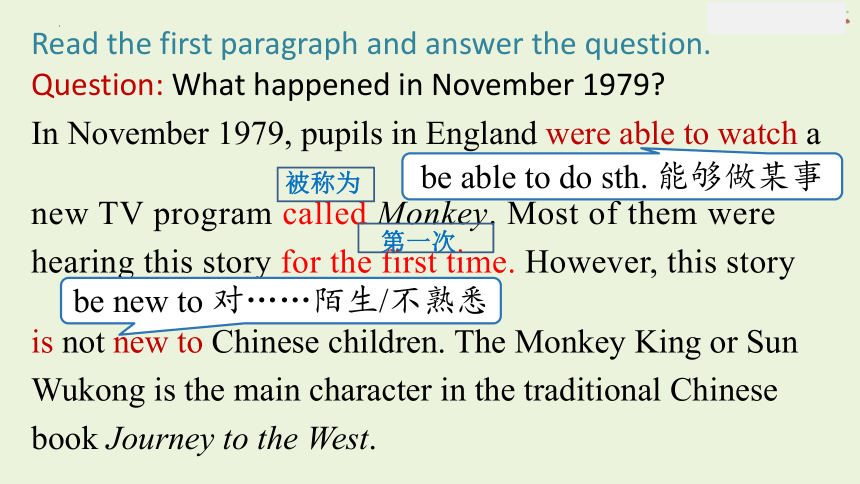
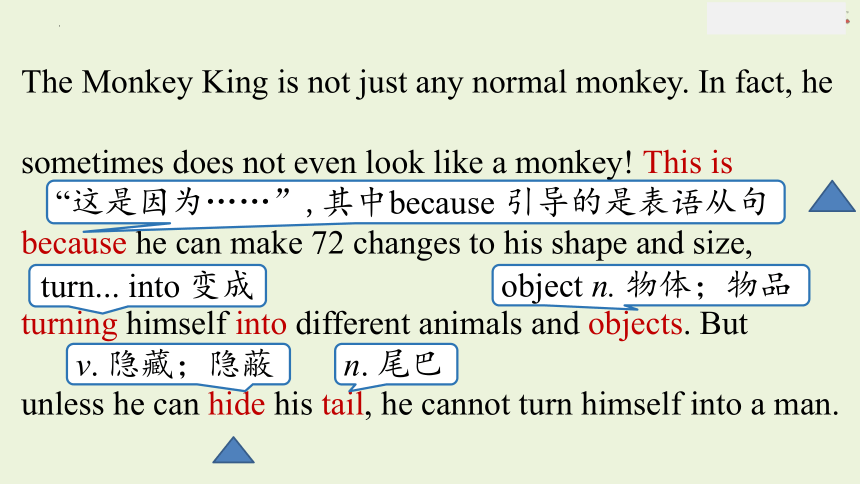
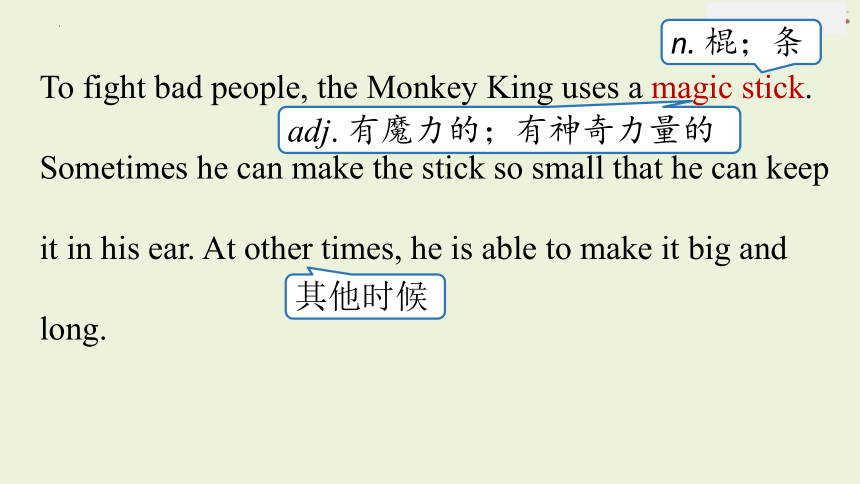
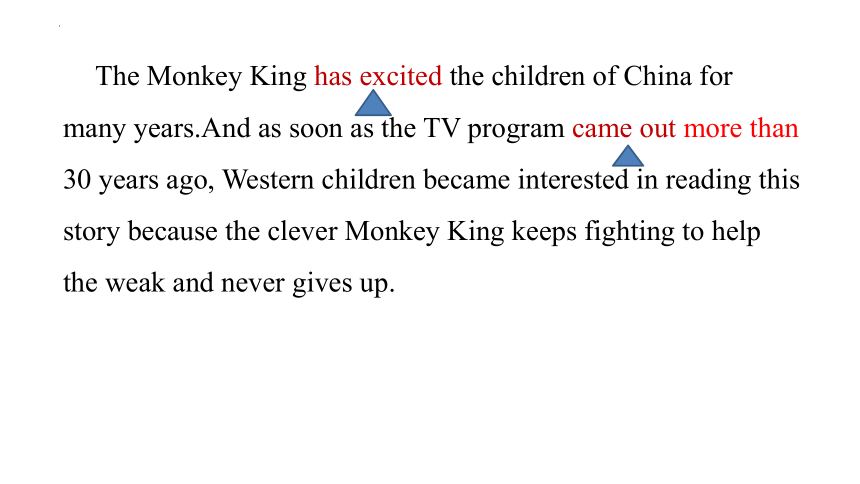
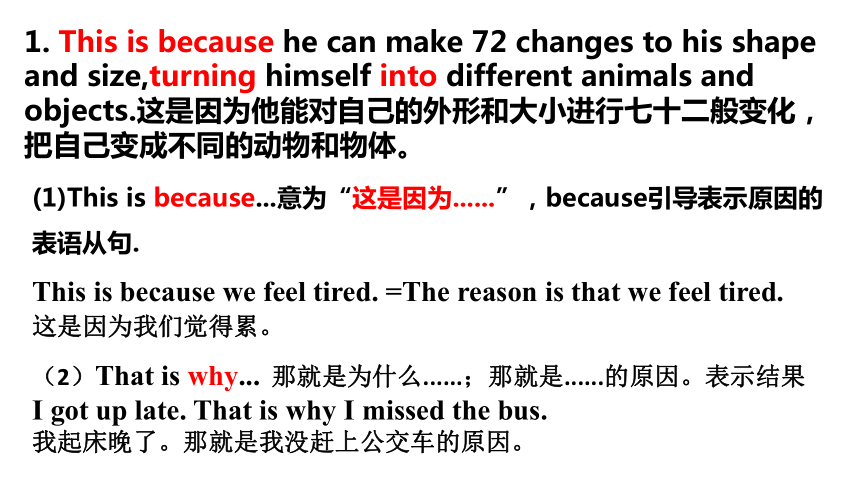
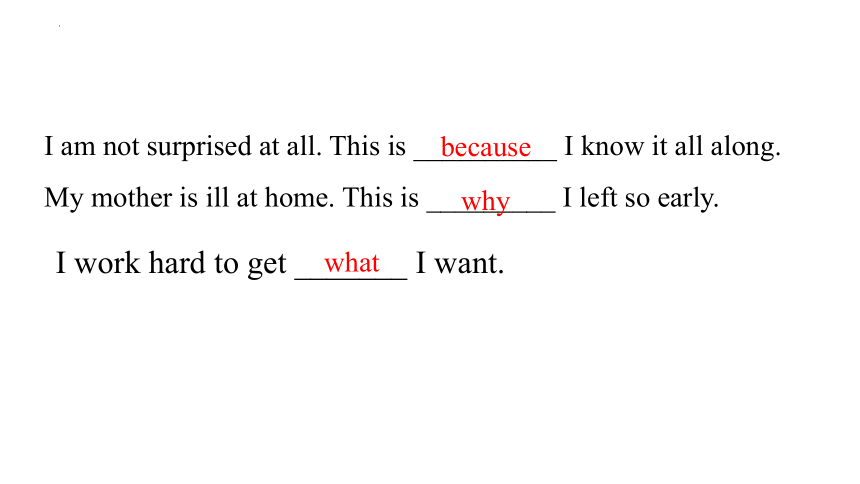
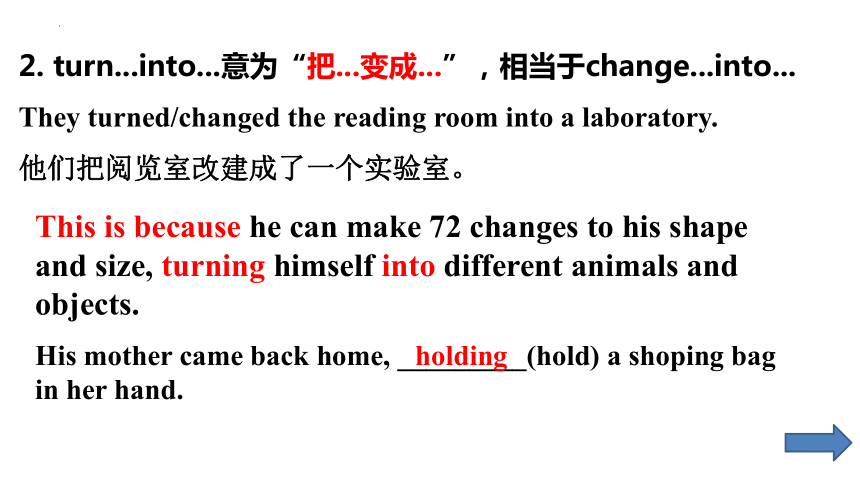
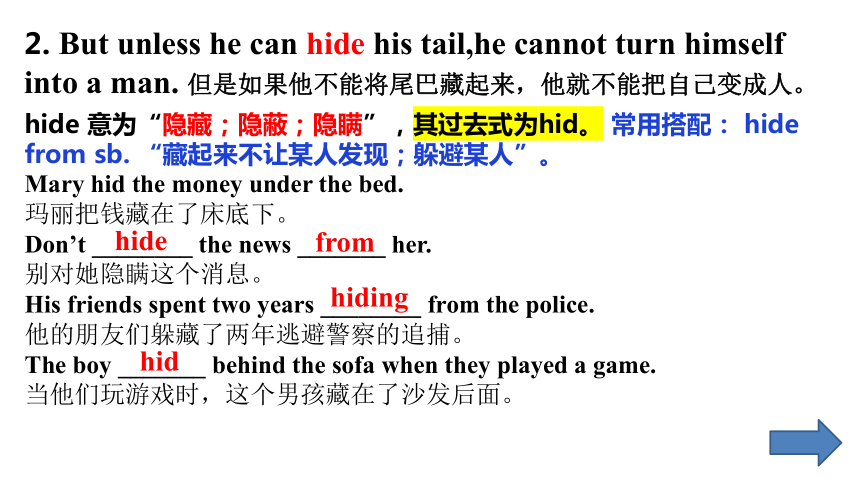
文档简介
(共24张PPT)
Unit6
Section A
(3a-3c)
Read the first paragraph and answer the question.
In November 1979, pupils in England were able to watch a
new TV program called Monkey. Most of them were hearing this story for the first time. However, this story
is not new to Chinese children. The Monkey King or Sun Wukong is the main character in the traditional Chinese book Journey to the West.
Question: What happened in November 1979
be new to 对……陌生/不熟悉
be able to do sth. 能够做某事
被称为
第一次
The Monkey King is not just any normal monkey. In fact, he sometimes does not even look like a monkey! This is because he can make 72 changes to his shape and size, turning himself into different animals and objects. But unless he can hide his tail, he cannot turn himself into a man.
object n. 物体;物品
n. 尾巴
v. 隐藏;隐蔽
“这是因为……”,其中because 引导的是表语从句
turn... into 变成
To fight bad people, the Monkey King uses a magic stick. Sometimes he can make the stick so small that he can keep it in his ear. At other times, he is able to make it big and long.
adj. 有魔力的;有神奇力量的
其他时候
n. 棍;条
The Monkey King has excited the children of China for many years.And as soon as the TV program came out more than 30 years ago, Western children became interested in reading this story because the clever Monkey King keeps fighting to help the weak and never gives up.
1. This is because he can make 72 changes to his shape and size,turning himself into different animals and objects.这是因为他能对自己的外形和大小进行七十二般变化,把自己变成不同的动物和物体。
(1)This is because...意为“这是因为......”,because引导表示原因的表语从句.
This is because we feel tired. =The reason is that we feel tired.
这是因为我们觉得累。
(2)That is why... 那就是为什么......;那就是......的原因。表示结果
I got up late. That is why I missed the bus.
我起床晚了。那就是我没赶上公交车的原因。
I am not surprised at all. This is __________ I know it all along.
My mother is ill at home. This is _________ I left so early.
because
why
I work hard to get _______ I want.
what
2. turn...into...意为“把...变成...”,相当于change...into...
They turned/changed the reading room into a laboratory.
他们把阅览室改建成了一个实验室。
His mother came back home, _________(hold) a shoping bag in her hand.
This is because he can make 72 changes to his shape and size, turning himself into different animals and objects.
holding
2. But unless he can hide his tail,he cannot turn himself into a man. 但是如果他不能将尾巴藏起来,他就不能把自己变成人。
hide 意为“隐藏;隐蔽;隐瞒”,其过去式为hid。 常用搭配: hide from sb. “藏起来不让某人发现;躲避某人”。
Mary hid the money under the bed.
玛丽把钱藏在了床底下。
Don’t ________ the news _______ her.
别对她隐瞒这个消息。
His friends spent two years ________ from the police.
他的朋友们躲藏了两年逃避警察的追捕。
The boy _______ behind the sofa when they played a game.
当他们玩游戏时,这个男孩藏在了沙发后面。
hide
from
hiding
hid
3. To fight bad people,the Monkey King uses a magic stick. 为了与坏人作斗争,美猴王使用一根魔力棒。
magic 形容词,意为“有魔力的;有神奇力量的”。
Tom took a rabbit from his magic hat.
汤姆从他的魔法帽里拿出来一只兔子。
【拓展】
★①magic还可做名词,意为魔术。
I was shocked at his magic.
★②magician 名词,意为“魔术师;巫师”。
The match result excited us.
excite v. 使激动;使兴奋
excitement
n. 激动;兴奋
excited adj. 激动的;兴奋的
exciting adj. 令人激动的
Hearing the exciting news, people shouted in excitement.
excite / k sa t/ v. 使激动; 使兴奋
The Monkey King has excited the children of China for many years.
1. The Monkey King has excited the children of China for many years.
本句中 has excited 是现在完成时结构。现在完成时表示从过去某一时间开始一直持续到现在的动作或状态,基本结构为“have/has + 动词的过去分词”。
Our school life has changed a lot since 2017. We have
more activities now.
has excited是现在完成时结构
4. And as soon as the TV program came out more than 30 years ago,western children became interested in reading his story because the clever Monkey King keeps fighting to help the weak and never gives up.
并且30多年前这个电视节目刚一推出,西方国家的孩子就对读这个故事产生了兴趣,因为聪明机智的美猴王一直坚持斗争去帮助弱者并且从不放弃。
(1)come out 意为“出版;发行;发表”,为不及物动词。
When will his new book come out 他的新书什么时候出版?
【拓展】come out一词多义
1.出来,出现
2.开花
3.泄露,传出
That magazine comes out every Monday.
The stars come out as soon as it is dark.
Some flowers have begun to come out.
The truth has come out at last.
(2)Western 形容词,意为“西方国家的;(尤指)欧美的;西方的
In some Western countries, Christmas is the most impotant festival.
【拓展】在表示方向的名词的词尾加后缀-ern,可构成相应的形容词,如:
east(东;东方)——eastern(东方的)
west(西;西方)——western(西方的)
south(南;南方的)——southern(南方的)
north(北;北方的)——northern(北方的)
1. Journey to the West is a _________ Chinese book. It tells one of the most popular stories in China.
2. When the English TV program Monkey ________ in 1979, Western children _________________________ this wonderful story.
traditional
came out
became interested in(reading)
3c Complete the sentences below with phrases from
the passage.
3. The Monkey King can ______________ to his body. He is able to _______________ different animals and objects.
4. The Monkey King ___________ make his magic stick small or large.
can/is able to
make 72 changes
turn (himself) into
一、根据首字母提示或汉语提示完成句子
1.Can a fox h its tail
2.Many people like this m show.
3.My grandpa is old and he walks with a s .
4.In some W countries, the song is very popular.
5.A spoon is an everyday (物品).
ide
agic
tick
estern
object
二、根据汉语意思完成句子
1.去年我第一次去了上海。
Last year I went to Shanghai _____ _____ _____ _____.
2.他的新小说是2016年9月份发行的。
His new novel ______ _____ in September 2016.
3.水沸腾时能变成水蒸气。
When water boils, it can _____ _____ steam.
4.休息了一会儿,他们继续开车。
After resting for a while, they ______________ _______.
for the first time
turn into
came out
kept/continued driving
5. As soon as the prince saw her, he fell in love with her. 王子一看到她就爱上了她。
fall in love with 意为“爱上;喜欢上”,强调动作。
She fell in love with the city when she got to Ji’nan last year.
去年她一到济南就喜欢上了这座城市。
6. The prince knew that unless the girl’s foot could fit the shoes,it was not the right girl.王子知道除非那个女孩的脚能穿上这只鞋,否则她就不是他要找的那位姑娘。
fit 动词,意为“适合;合身”。
This suit doesn’t fit me well. Do you have a larger size
这套西装我穿着并不怎么合身,你们有大一点的尺码吗?
7. The new couple were so happy that they couldn’t stop smiling when they got married. 这对新人结婚时如此高兴以至于他们微笑不已。
(1)couple 可数名词,此处意为“夫妻”,还可指两件事物
常用短语: a couple of ”一对;几个;一些“。
The couple seemed to be very happy. 那对夫妇看上去很幸福。
A couple of boys are making their way to school. 两个男孩正在上学的路上。
The prince will return to his country in a couple of days.
王子几天后将回到它的国家。
(2)smile不及物动词,意为“微笑;笑”,常用搭配:smile at “对...微笑”。 smile 也可用作名词,意为“微笑;笑容”。
Lisa smiled at us when she was passing by.
丽萨路过的时候朝我们微笑。
【辨析】 smile 与 laugh
smile “微笑”,常表示满意,怀有善意的笑。
laugh “大笑”,常表示笑出声,既有声音,又有表情。常用搭配: laugh at, 意为“嘲笑”。
(3)marry 动词,意为“结婚;嫁;娶”。 常见搭配:
get married 结婚 不能与表示时间段的状语连用
be married 结婚 可与表示时间段的状语连用
marry sb. 嫁给某人,与某人结婚
marry sb. to sb. 把某人嫁给某人
be/get married to sb. 与某人结婚
She married a doctor. 她嫁给了一位医生。
She decided to marry her daughter to a rich man.她决定把自己的女儿嫁给一个有钱人。
My grandma got married to my grandpa in 1966.
1966年,我的祖母与我的祖父结婚了。
Unit6
Section A
(3a-3c)
Read the first paragraph and answer the question.
In November 1979, pupils in England were able to watch a
new TV program called Monkey. Most of them were hearing this story for the first time. However, this story
is not new to Chinese children. The Monkey King or Sun Wukong is the main character in the traditional Chinese book Journey to the West.
Question: What happened in November 1979
be new to 对……陌生/不熟悉
be able to do sth. 能够做某事
被称为
第一次
The Monkey King is not just any normal monkey. In fact, he sometimes does not even look like a monkey! This is because he can make 72 changes to his shape and size, turning himself into different animals and objects. But unless he can hide his tail, he cannot turn himself into a man.
object n. 物体;物品
n. 尾巴
v. 隐藏;隐蔽
“这是因为……”,其中because 引导的是表语从句
turn... into 变成
To fight bad people, the Monkey King uses a magic stick. Sometimes he can make the stick so small that he can keep it in his ear. At other times, he is able to make it big and long.
adj. 有魔力的;有神奇力量的
其他时候
n. 棍;条
The Monkey King has excited the children of China for many years.And as soon as the TV program came out more than 30 years ago, Western children became interested in reading this story because the clever Monkey King keeps fighting to help the weak and never gives up.
1. This is because he can make 72 changes to his shape and size,turning himself into different animals and objects.这是因为他能对自己的外形和大小进行七十二般变化,把自己变成不同的动物和物体。
(1)This is because...意为“这是因为......”,because引导表示原因的表语从句.
This is because we feel tired. =The reason is that we feel tired.
这是因为我们觉得累。
(2)That is why... 那就是为什么......;那就是......的原因。表示结果
I got up late. That is why I missed the bus.
我起床晚了。那就是我没赶上公交车的原因。
I am not surprised at all. This is __________ I know it all along.
My mother is ill at home. This is _________ I left so early.
because
why
I work hard to get _______ I want.
what
2. turn...into...意为“把...变成...”,相当于change...into...
They turned/changed the reading room into a laboratory.
他们把阅览室改建成了一个实验室。
His mother came back home, _________(hold) a shoping bag in her hand.
This is because he can make 72 changes to his shape and size, turning himself into different animals and objects.
holding
2. But unless he can hide his tail,he cannot turn himself into a man. 但是如果他不能将尾巴藏起来,他就不能把自己变成人。
hide 意为“隐藏;隐蔽;隐瞒”,其过去式为hid。 常用搭配: hide from sb. “藏起来不让某人发现;躲避某人”。
Mary hid the money under the bed.
玛丽把钱藏在了床底下。
Don’t ________ the news _______ her.
别对她隐瞒这个消息。
His friends spent two years ________ from the police.
他的朋友们躲藏了两年逃避警察的追捕。
The boy _______ behind the sofa when they played a game.
当他们玩游戏时,这个男孩藏在了沙发后面。
hide
from
hiding
hid
3. To fight bad people,the Monkey King uses a magic stick. 为了与坏人作斗争,美猴王使用一根魔力棒。
magic 形容词,意为“有魔力的;有神奇力量的”。
Tom took a rabbit from his magic hat.
汤姆从他的魔法帽里拿出来一只兔子。
【拓展】
★①magic还可做名词,意为魔术。
I was shocked at his magic.
★②magician 名词,意为“魔术师;巫师”。
The match result excited us.
excite v. 使激动;使兴奋
excitement
n. 激动;兴奋
excited adj. 激动的;兴奋的
exciting adj. 令人激动的
Hearing the exciting news, people shouted in excitement.
excite / k sa t/ v. 使激动; 使兴奋
The Monkey King has excited the children of China for many years.
1. The Monkey King has excited the children of China for many years.
本句中 has excited 是现在完成时结构。现在完成时表示从过去某一时间开始一直持续到现在的动作或状态,基本结构为“have/has + 动词的过去分词”。
Our school life has changed a lot since 2017. We have
more activities now.
has excited是现在完成时结构
4. And as soon as the TV program came out more than 30 years ago,western children became interested in reading his story because the clever Monkey King keeps fighting to help the weak and never gives up.
并且30多年前这个电视节目刚一推出,西方国家的孩子就对读这个故事产生了兴趣,因为聪明机智的美猴王一直坚持斗争去帮助弱者并且从不放弃。
(1)come out 意为“出版;发行;发表”,为不及物动词。
When will his new book come out 他的新书什么时候出版?
【拓展】come out一词多义
1.出来,出现
2.开花
3.泄露,传出
That magazine comes out every Monday.
The stars come out as soon as it is dark.
Some flowers have begun to come out.
The truth has come out at last.
(2)Western 形容词,意为“西方国家的;(尤指)欧美的;西方的
In some Western countries, Christmas is the most impotant festival.
【拓展】在表示方向的名词的词尾加后缀-ern,可构成相应的形容词,如:
east(东;东方)——eastern(东方的)
west(西;西方)——western(西方的)
south(南;南方的)——southern(南方的)
north(北;北方的)——northern(北方的)
1. Journey to the West is a _________ Chinese book. It tells one of the most popular stories in China.
2. When the English TV program Monkey ________ in 1979, Western children _________________________ this wonderful story.
traditional
came out
became interested in(reading)
3c Complete the sentences below with phrases from
the passage.
3. The Monkey King can ______________ to his body. He is able to _______________ different animals and objects.
4. The Monkey King ___________ make his magic stick small or large.
can/is able to
make 72 changes
turn (himself) into
一、根据首字母提示或汉语提示完成句子
1.Can a fox h its tail
2.Many people like this m show.
3.My grandpa is old and he walks with a s .
4.In some W countries, the song is very popular.
5.A spoon is an everyday (物品).
ide
agic
tick
estern
object
二、根据汉语意思完成句子
1.去年我第一次去了上海。
Last year I went to Shanghai _____ _____ _____ _____.
2.他的新小说是2016年9月份发行的。
His new novel ______ _____ in September 2016.
3.水沸腾时能变成水蒸气。
When water boils, it can _____ _____ steam.
4.休息了一会儿,他们继续开车。
After resting for a while, they ______________ _______.
for the first time
turn into
came out
kept/continued driving
5. As soon as the prince saw her, he fell in love with her. 王子一看到她就爱上了她。
fall in love with 意为“爱上;喜欢上”,强调动作。
She fell in love with the city when she got to Ji’nan last year.
去年她一到济南就喜欢上了这座城市。
6. The prince knew that unless the girl’s foot could fit the shoes,it was not the right girl.王子知道除非那个女孩的脚能穿上这只鞋,否则她就不是他要找的那位姑娘。
fit 动词,意为“适合;合身”。
This suit doesn’t fit me well. Do you have a larger size
这套西装我穿着并不怎么合身,你们有大一点的尺码吗?
7. The new couple were so happy that they couldn’t stop smiling when they got married. 这对新人结婚时如此高兴以至于他们微笑不已。
(1)couple 可数名词,此处意为“夫妻”,还可指两件事物
常用短语: a couple of ”一对;几个;一些“。
The couple seemed to be very happy. 那对夫妇看上去很幸福。
A couple of boys are making their way to school. 两个男孩正在上学的路上。
The prince will return to his country in a couple of days.
王子几天后将回到它的国家。
(2)smile不及物动词,意为“微笑;笑”,常用搭配:smile at “对...微笑”。 smile 也可用作名词,意为“微笑;笑容”。
Lisa smiled at us when she was passing by.
丽萨路过的时候朝我们微笑。
【辨析】 smile 与 laugh
smile “微笑”,常表示满意,怀有善意的笑。
laugh “大笑”,常表示笑出声,既有声音,又有表情。常用搭配: laugh at, 意为“嘲笑”。
(3)marry 动词,意为“结婚;嫁;娶”。 常见搭配:
get married 结婚 不能与表示时间段的状语连用
be married 结婚 可与表示时间段的状语连用
marry sb. 嫁给某人,与某人结婚
marry sb. to sb. 把某人嫁给某人
be/get married to sb. 与某人结婚
She married a doctor. 她嫁给了一位医生。
She decided to marry her daughter to a rich man.她决定把自己的女儿嫁给一个有钱人。
My grandma got married to my grandpa in 1966.
1966年,我的祖母与我的祖父结婚了。
同课章节目录
- Unit 1 What's the matter?
- Section A
- Section B
- Unit 2 I'll help to clean up the city parks.
- Section A
- Section B
- Unit 3 Could you please clean your room?
- Section A
- Section B
- Unit 4 Why don't you talk to your parents?
- Section A
- Section B
- Unit 5 What were you doing when the rainstorm came
- Section A
- Section B
- Review of Units 1-5
- Unit 6 An old man tried to move the mountains.
- Section A
- Section B
- Unit 7 What's the highest mountain in the world?
- Section A
- Section B
- Unit 8 Have you read Treasure Island yet?
- Section A
- Section B
- Unit 9 Have you ever been to a museum?
- Section A
- Section B
- Unit 10 I've had this bike for three years.
- Section A
- Section B
